Table magnifiers: description and selection rules

Table magnifiers intended for both professional use and household purposes. This device helps to see the smallest details. This article will discuss its characteristics, purpose, best models and selection criteria.

Characteristic
Table magnifier is a design with a large magnifying glass that allows the relative breadth of the field of view. The magnifying glass is located on the tripod. He might be articulated or flexible. Due to this, the device can be moved, tilted, taken to the side. Some loops have clamp for fixing to the surface of a table or shelf.
There are models that are equipped with backlight. She happens LED or fluorescent. The first option is more practical. When working, it is excluded that the shadow falls on the object. Plus, LED bulbs have a softer light and consume less energy. Fluorescent backlit magnifiers are much cheaper, but they heat up quickly and have a short lifespan.
Large models of magnifiers can have a high magnification ratio... So, there are models with 10x and 20x magnification. Such magnifiers are used for certain types of work for industrial purposes.
Table magnifiers have various diopters... The choice of diopters also depends on the purpose. The optimal indicator is 3 diopters. Some models are designed for manicure and cosmetic work. Magnifiers with 5 and 8 diopters are suitable for such purposes.
However, it is worth noting that 8 diopter magnifiers are often discomforting to the eyes and inconvenient to use.


Types
Tabletop appliances are divided into specific categories.
- Miniature models are small in size. The base is placed on a table stand or on a clothespin. Models are backlit. Miniature appliances are popular with collectors and women who love handicrafts.
Also, such magnifiers are used at home for manicure services.


- Accessories on a stand. The devices have a large size and a sufficiently large stand that holds the structure on the table. The models have different types of lenses and illumination. The use of stand magnifiers is not very common.
They are used for laboratory and radio installation work.


- Clamp and bracket magnifiers are considered the most popular type.... The base is attached to the surface with a clamp into which the bracket pin is inserted. The bracket is a two-knee type holder. Its length is about 90 cm. The bracket design can have both external and internal placement of the spring.
Due to the use of a magnifying glass with a clamp and a bracket, additional space for work appears on the table, which is very convenient.

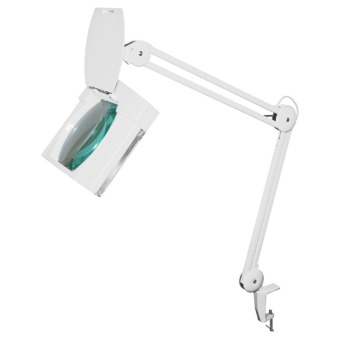
- Instrument with clamp and gooseneck. The design includes a base on a flexible leg, which allows you to adjust the angle of the magnifier. The wide rectangular lens has 3 diopters, which eliminates distortion of the surface in question.


Appointment
Table magnifiers are widely used in various fields.... They can be used for carpentry worksuch as burning out. Tabletop fixtures are popular with jewelry craftsmen and lovers of radio components.
Especially desktop magnifiers are common in the field of cosmetology. Such devices can be seen in beauty parlors for cleaning or injection procedures.The magnification for loops of this type is 5D. Artists of manicure, pedicure and tattooing use table magnifiers with a gooseneck, illumination and 3D magnification.
Desktop magnifiers can be used for reading. For this, it is better to choose lenses with 3 diopters to avoid eye fatigue.

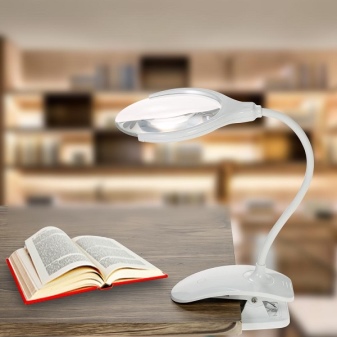
Modern models
An overview of the best modern desktop models opens tripod magnifier LPSh 8x / 25 mm. The manufacturer of this desktop magnifier is the Kazan Optical and Mechanical Plant, a leader among the manufacturers of optical devices. The lens material is optical glass. The lens is built into a lightweight polymer housing. The device has an 8x magnification capacity. The main features of the model:
- special glass protection against deformation;
- warranty - 3 years;
- legged construction;
- antistatic lens coating;
- attractive cost.
The only one minus it is considered the ability of the magnifier to examine details not exceeding 2 cm.
The model is suitable for working with diagrams, boards, and will also appeal to numismatists and philatelists.
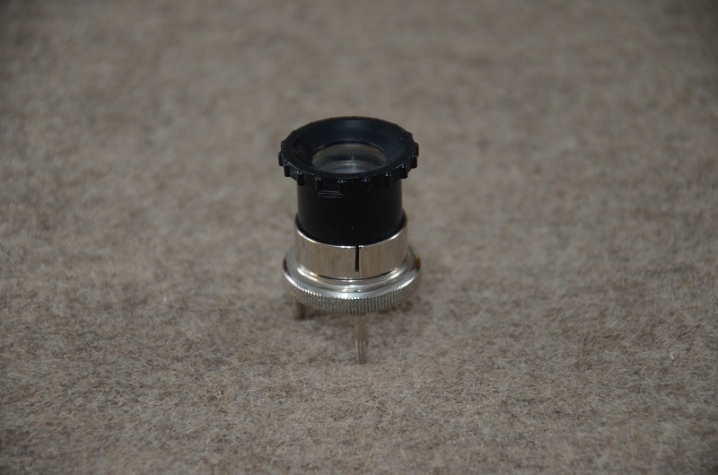
Tabletop magnifier Rexant 8x. The model has a clamp and backlight. The sliding mechanism allows the built-in optical system to be positioned at the desired angle. The LED ring light makes it possible to work in complete darkness and eliminates the possibility of casting shadows. With the help of a clamp, the magnifier can be installed on any surface. Main characteristics:
- lens size - 127 mm;
- large backlight resource;
- power consumption - 8 W;
- mechanism adjustment radius - 100 cm;
- the stability of the device;
- models in black and white.
Insignificant disadvantage such a table magnifier is considered to be 3.5 kg.
The optical device is used for the work of cosmetologists, biologists, medical workers, in the field of tattooing and needlework.
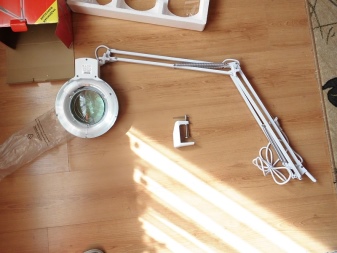
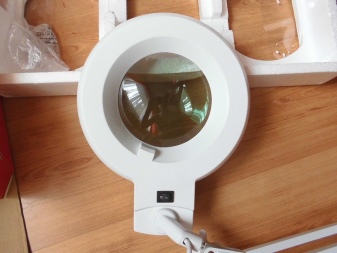
Magnifier Veber 8611 3D / 3x. Table model with stand and flexible leg. The compactness of the magnifier allows you to use it anywhere and on any surface. The weight of the device is less than 1 kg. The model is perfect for visiting manicure, as well as for jewelry work and needlework. Peculiarities:
- the presence of LED backlight;
- power consumption - 11 W;
- glass diameter - 12.7 cm;
- tripod height - 31 cm;
- stand size - 13 by 17 cm.

Desktop magnifier CT Brand-200. The device is widely used. Specifications:
- 5x magnification;
- focal length - 33 cm;
- the presence of a fluorescent backlight with a power of 22 W;
- height - 51 cm;
- lens length and width - 17 and 11 cm.


Selection rules
The choice of a desktop magnifier is based on the tasks for which this magnifier will be used. Along with this, a suitable optical device is selected with its own characteristics and functionality.
Several factors can be decisive when choosing.
- Lens material. There are three types of materials: polymer, glass and plastic. The cheapest option is plastic. But it has its drawbacks - the surface is scratched quickly. Glass lenses are more reliable, but have the risk of breaking if dropped. An acrylic polymer is considered the best option.
- Backlight... The presence of backlight allows you to work in a completely dark room. In this case, a shadow will not be cast on the object in question. There are more advanced magnifier models that are equipped with a variety of infrared and ultraviolet lamps.
- Design. It is better to choose models with a compact and comfortable stand or devices with a clamp, which will significantly save space on the table.
- Magnification ability... The higher the measurement frequency, the greater the magnification of the subject and the narrower the viewing angle. For the device that will be used for various tasks, choose a 5-fold or 7-fold capacity.

You can watch a video review of the NEWACALOX X5 illuminated desktop magnifier for a home workshop below.













The comment was sent successfully.